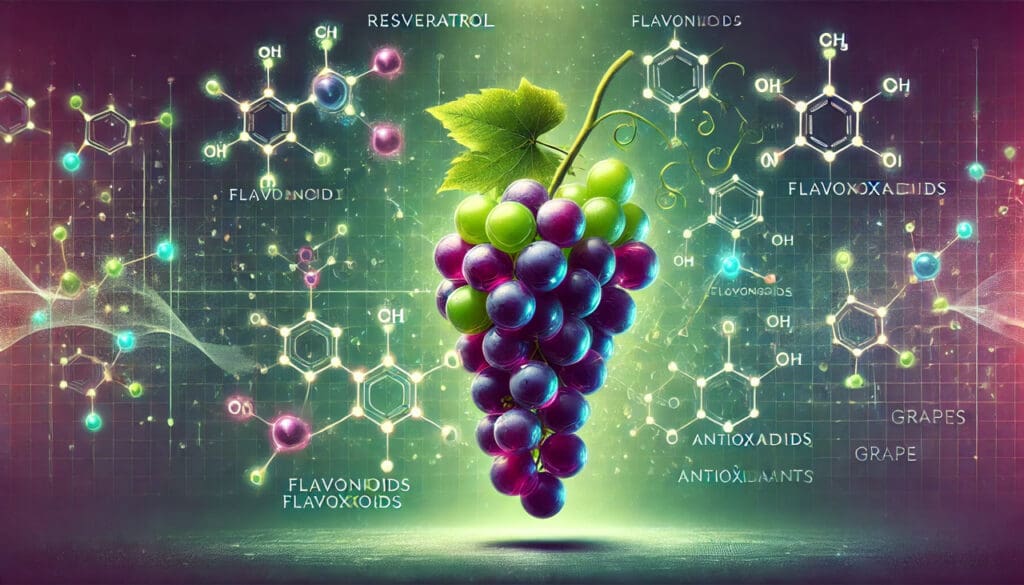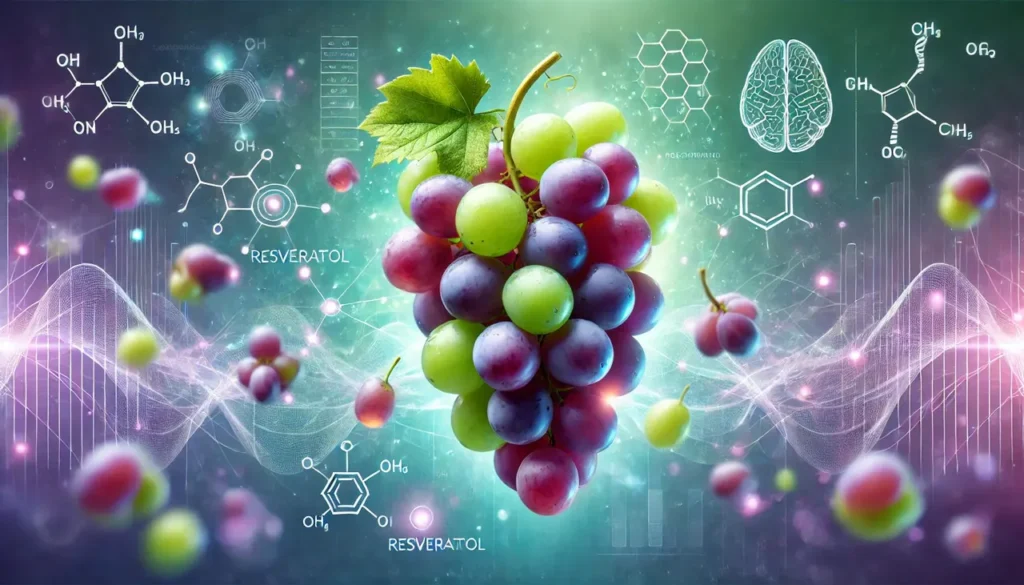Grape (Vitis vinifera) is a widely cultivated fruit known for its rich flavor and versatility in various culinary applications, from fresh consumption to fermentation into wine. Beyond its palatability, grape has garnered attention for its potential health benefits, particularly as a nootropic supplement. Nootropics are substances that may enhance cognitive function, memory, creativity, and overall brain performance. This article provides a comprehensive overview of grape, detailing its sources, chemistry, physiological mechanisms, potential nootropic benefits, recommended dosages, side effects, interactions, and other essential considerations for safe supplementation.
You May Also Like:
Sources of Grape
Grapes are primarily cultivated in temperate regions around the world, with the Mediterranean, California, and parts of South America being notable producers. The two main varieties are table grapes and wine grapes. While both types provide health benefits, wine grapes are particularly rich in polyphenolic compounds, which are associated with numerous health advantages. Key sources of grape include:
- Fresh Grapes: Eaten raw, grapes are an excellent source of vitamins C and K, as well as antioxidants like resveratrol and quercetin.
- Grape Juice: This beverage retains many of the beneficial compounds found in whole grapes, providing a convenient option for supplementation.
- Red Wine: Moderate consumption of red wine is linked to several health benefits, attributed largely to its polyphenolic content.
- Grape Seed Extract: Derived from the seeds of grapes, this supplement is rich in proanthocyanidins, a class of antioxidants that may provide additional health benefits.
Grapes are not only delicious but also nutrient-dense, making them a viable option for individuals seeking to enhance their cognitive health through dietary choices or supplementation.
Age Like Fine Wine with Grape Supplements for Anti-Aging and Mental Wellness—Order Now on Amazon!

Chemistry of Grape
The chemical composition of grape includes a variety of bioactive compounds, the most notable being polyphenols, flavonoids, and resveratrol. These compounds contribute to the health benefits attributed to grape consumption.
- Polyphenols: Grapes are rich in polyphenolic compounds, particularly flavonoids like quercetin, catechins, and proanthocyanidins. These compounds exhibit potent antioxidant properties, which help neutralize free radicals and reduce oxidative stress in the body.
- Resveratrol: A polyphenolic compound found predominantly in red wine and grape skins, resveratrol has gained significant attention for its potential neuroprotective effects and ability to promote longevity. Resveratrol activates sirtuins, a family of proteins associated with cellular regulation and stress resistance.
- Vitamins and Minerals: Grapes provide essential vitamins such as vitamins C and K, as well as important minerals like potassium and manganese, which contribute to overall health and well-being.
These chemical components work synergistically to promote health, making grapes a valuable addition to a nootropic regimen.

Physiological Mechanisms of Grape in the Body and Brain
The physiological effects of grape on the body and brain are primarily mediated through its antioxidant properties, anti-inflammatory effects, and influence on vascular health.
- Antioxidant Effects: Grapes are abundant in antioxidants, which help combat oxidative stress, a significant contributor to cognitive decline and neurodegenerative diseases. By neutralizing free radicals, grape polyphenols help protect neuronal cells from damage, potentially reducing the risk of conditions such as Alzheimer’s disease and Parkinson’s disease.
- Anti-Inflammatory Properties: Chronic inflammation is linked to various cognitive impairments and neurodegenerative disorders. Grapes contain compounds that exhibit anti-inflammatory effects, potentially mitigating the inflammatory processes in the brain and promoting better cognitive function.
- Vascular Health: The polyphenols in grapes are known to enhance endothelial function and improve blood flow by promoting nitric oxide production. Increased blood flow to the brain is crucial for delivering oxygen and nutrients, supporting cognitive performance, and enhancing mental clarity.
- Neuroprotective Mechanisms: Resveratrol and other grape-derived compounds have been shown to modulate signaling pathways related to neuronal survival and function. For instance, resveratrol may promote neurogenesis (the formation of new neurons) and synaptic plasticity, essential processes for learning and memory.
Support Anti-Aging and Mental Sharpness with Grape—Shop Now on Amazon!

Nootropic Benefits of Grape
Grape’s potential as a nootropic arises from its diverse bioactive compounds and their physiological effects on cognitive function. The following benefits warrant consideration:
- Improved Sleep Quality: Emerging evidence suggests that the compounds found in grapes may aid in enhancing sleep quality. Better sleep is closely linked to improved cognitive function, making grapes an attractive addition for those seeking to optimize their mental performance.
- Potential Anti-Anxiety Effects: Preliminary studies indicate that grape-derived supplements might have anxiolytic effects, helping to reduce anxiety levels. By promoting a calm mental state, they may enhance cognitive clarity and decision-making abilities.
- Support for Brain Plasticity: Grape polyphenols have been linked to promoting neuroplasticity—the brain’s ability to adapt and reorganize itself. This is crucial for learning new skills and recovering from injuries, thereby further establishing grapes’ role in cognitive health.

Dosage and Supplementation Guidelines
The appropriate dosage of grape supplements can vary based on individual needs and the specific form of the supplement. While there is no official recommended daily allowance (RDA) for grape or its extracts, the following guidelines can help inform safe and effective usage:
- General Dosage: For general cognitive support, doses ranging from 150 to 300 mg of grape seed extract or equivalent polyphenolic content may be considered beneficial. Standardized extracts that contain at least 95% proanthocyanidins are recommended for optimal efficacy.
- Grape Juice: Consuming 100 to 250 mL of pure grape juice daily can provide a substantial intake of beneficial compounds. It is important to choose 100% juice without added sugars or preservatives.
- Wine Consumption: Moderate wine consumption (1-2 glasses of red wine per day) may provide cognitive benefits attributed to grape polyphenols. However, it is crucial to consider individual tolerance and the health risks associated with alcohol consumption.
- Grape Seed Extract: For specific nootropic effects, grape seed extract may be taken in doses ranging from 100 to 300 mg daily, depending on the concentration of proanthocyanidins and individual health goals.
As with any supplement, individuals should consult with a healthcare professional before beginning grape supplementation, particularly if they have pre-existing health conditions or are taking medications.
Enhance Anti-Aging Benefits and Mental Health with Grape Supplements—Buy Today on Amazon!

Side Effects and Safety
Grape and its extracts are generally considered safe when consumed in moderate amounts. However, some individuals may experience side effects, particularly at higher dosages. Common side effects include:
- Gastrointestinal Distress: Some individuals may experience nausea, diarrhea, or abdominal discomfort when taking grape seed extract or grape juice in excess.
- Allergic Reactions: Rare allergic reactions can occur, manifesting as itching, rash, or swelling. Those with known sensitivities to grapes should exercise caution.
- Drug Interactions: Grape juice can inhibit cytochrome P450 enzymes, particularly CYP3A4, which are responsible for metabolizing various medications. This interaction can lead to increased blood levels of certain drugs, potentially resulting in adverse effects. Patients on medications such as statins, calcium channel blockers, and certain antihistamines should consult their healthcare provider before consuming grape products.
Interactions with Other Supplements and Medications
Understanding potential interactions between grape supplements and other medications or supplements is essential for safe use:
- Blood Thinners: Grape extract may have anticoagulant effects, enhancing the activity of blood-thinning medications such as warfarin. Regular monitoring of coagulation parameters is recommended for individuals on such medications.
- Antihypertensive Medications: Given the vasodilatory effects of grape polyphenols, individuals taking blood pressure-lowering medications should monitor their blood pressure closely to avoid hypotension.
- Other Nootropics: Grape extract can be safely combined with other nootropic supplements, such as caffeine or ginkgo biloba, which may enhance cognitive function. However, individuals should assess their tolerance and potential synergistic effects.
- Hormonal Therapies: The flavonoids in grapes may exert estrogen-like effects, potentially influencing the efficacy of hormonal therapies. Individuals undergoing hormone replacement therapy should consult with their healthcare provider before starting grape supplements.
Risks for Individuals with Certain Health Conditions
While grape supplements are generally safe, individuals with specific health conditions should approach supplementation with caution:
- Liver Disease: Those with liver impairments should be cautious, as the liver metabolizes many compounds found in grape supplements. Consulting a healthcare professional before supplementation is advisable.
- Kidney Disease: Grapes contain moderate amounts of potassium, which can be a concern for individuals with kidney disease. Monitoring potassium intake is crucial for those with compromised kidney function.
- Pregnancy and Breastfeeding: Pregnant or breastfeeding women should consult with their healthcare provider before starting grape supplements, as safety during these periods is not well-established.
Feel Youthful Inside and Out with Grape for Anti-Aging and Mental Health—Order Today on Amazon!

Conclusion: Should You Consider Grape as a Nootropic?
Grape’s potential nootropic benefits, stemming from its rich array of bioactive compounds, present an intriguing option for those seeking to enhance cognitive function and overall brain health. With its antioxidant properties, mood-regulating effects, and ability to promote vascular health, grape may contribute positively to cognitive performance. Additionally, the presence of resveratrol and flavonoids suggests that regular consumption may help mitigate age-related cognitive decline, providing a proactive approach to maintaining mental sharpness as one ages.
Incorporating grapes into your diet, whether through fresh consumption, juice, or supplements, could be a delicious and healthy strategy. It is essential to consider individual health conditions and consult with a healthcare professional to tailor the approach to personal needs. Furthermore, while the potential benefits are promising, more research is needed to fully understand the extent of grape’s nootropic effects and its optimal dosages. As with any supplement, a holistic approach to cognitive health—encompassing a balanced diet, regular exercise, and mental stimulation—will yield the best results. Overall, grape represents a compelling addition to the realm of nootropics, inviting further exploration into its cognitive-enhancing capabilities.

References:
- The Relevance of Dietary Polyphenols in Cardiovascular Protection. Retrieved from: https://pubmed.ncbi.nlm.nih.gov/28356040/
- What are the health benefits of grapes? Retrieved from: https://www.medicalnewstoday.com/articles/271156
- 10 Health Benefits of Grapes. Retrieved from: https://health.clevelandclinic.org/health-benefits-of-grapes
- 7 Health Benefits of Grapes. Retrieved from: https://www.health.com/food/benefits-of-grapes
- Grape bioactive molecules, and the potential health benefits in reducing the risk of heart diseases. Retrieved from: https://pmc.ncbi.nlm.nih.gov/articles/PMC8567006/
- The effect of grape interventions on cognitive and mental performance in healthy participants and those with mild cognitive impairment: a systematic review of randomized controlled trials. Retrieved from: https://pmc.ncbi.nlm.nih.gov/articles/PMC8829676/
Important Note: The information contained in this article is for general informational purposes only, and should not be construed as health or medical advice, nor is it intended to diagnose, prevent, treat, or cure any disease or health condition. Before embarking on any diet, fitness regimen, or program of nutritional supplementation, it is advisable to consult your healthcare professional in order to determine its safety and probable efficacy in terms of your individual state of health.
Regarding Nutritional Supplements Or Other Non-Prescription Health Products: If any nutritional supplements or other non-prescription health products are mentioned in the foregoing article, any claims or statements made about them have not been evaluated by the U.S. Food and Drug Administration, and such nutritional supplements or other health products are not intended to diagnose, treat, cure, or prevent any disease.


